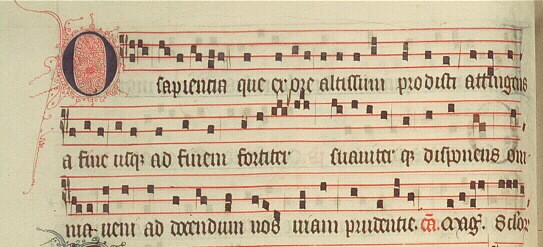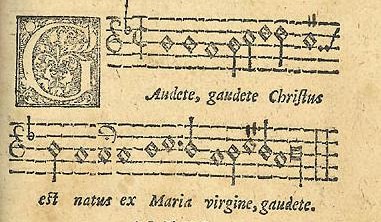The seven “O” antiphons of Advent are an old tradition in the Roman Church. Since at least the eighth century they have accompanied the Magnificat canticle of Evening Prayer, starting December 17 and ending on December 23.
The seven “O” antiphons combine our present hopes for the coming of the Divine Savior with the ancient prophesies, all referring to the Book of Isaiah. In like manner Our Lord Jesus Himself explained His works on earth by interpreting OT prophesy to His contemporaries. All the antiphons all end in the call “Veni!” / “Come!”, much like St. John’s Book of Revelation.
Use your last week of this penitential time to prepare for Holy Night by praying the seven “O” antiphons of Advent! Here they are, in Latin as well as Enlish:
December 17: “O Sapientia” / “O Wisdom”
(from Isaiah 11:2-3 and 28:29)
O Sapientia, quae ex ore Altissimi prodiisti,
attingens a fine usque ad finem,
fortiter suaviterque disponens omnia:
veni ad docendum nos viam prudentiae.
O Wisdom, Who didst come out of the mouth of the Most High,
reaching from end to end
and ordering all things mightily and sweetly:
come and teach us the way of prudence.

December 18: “O Adonai”
(from Isaiah 11:4-5 and 33:22)
O Adonai, et Dux domus Israel,
qui Moysi in igne flammae rubi apparuisti,
et ei in Sina legem dedisti:
veni ad redimendum nos in brachio extento.
O Adonai, and Leader of the house of Israel,
Who didst appear to Moses in the flame of the burning bush,
and didst give unto him the Law on Sinai:
come and with an outstretched arm redeem us.

December 19: “O Radix Jesse” / “O Root of Jesse”
(Isaiah 11:1 and 11:10)
O Radix Jesse, qui stas in signum populorum,
super quem continebunt reges os suum,
quem Gentes deprecabuntur:
veni ad liberandum nos, jam noli tardare.
O Root of Jesse, Who dost stand for an ensign of the people,
before Whom kings shall keep silence,
and unto Whom the Gentiles shall make their supplication:
come to deliver us, and tarry not.

December 20: “O Clavis David” / “O Key of David”
(from Isaiah 9:6 and 22:22)
O Clavis David, et sceptrum domus Israel;
qui aperis, et nemo claudit;
claudis, et nemo aperit:
veni, et educ vinctum de domo carceris, sedentem in tenebris, et umbra mortis.
O Key of David and Sceptre of the house of Israel,
Who dost open and no man doth shut,
Who dost shut and no man doth open,
come and bring forth from his prisonhouse the captive that sitteth in darkness and in the shadow of death.

December 21: “O Oriens”/”O Dawn of the East”
(from Isaiah 9:2)
O Oriens,
splendor lucis æternæ,
et sol justitiæ:
veni, et illumina sedentes in tenebris, et umbra mortis.
O Dawn of the East,
Brightness of the Light Eternal
and Sun of Justice,
come and enlighten them that sit in darkness and in the shadow of death.

December 22: “O Rex Gentium” / “O King of the Gentiles”
(from Isaiah 2:4 and 9:7)
O Rex Gentium, et desideratus earum,
lapisque angularis,
qui facis utraque unum:
veni, et salva hominem, quem de limo formasti.
O King of the Gentiles and the Desired of them,
Thou Cornerstone
that dost make both one,
come and deliver man, whom Thou didst form out of the dust of the earth.

December 23: “O Emmanuel”
(from Isaiah 7:14)
O Emmanuel,
Rex et legifer noster,
exspectatio gentium, et Salvator earum:
veni ad salvandum nos Domine Deus noster.
O Emmanuel,
our King and Lawgiver,
the Expected of the Nations and their Saviour,
come to save us, O Lord our God.





